
LeBron James and His Decision: Ignorance, Knowledge, and The Absurd
2018-06-28
With the second LeBron James in Cleveland free agency decision looming, let’s all take a deep breath and take a journey through how to deal with ignorance, how we attain knowledge, and what to do in the face of this absurd situation.
LeCision 3.0
What will LeBron decide?
Do you know? Does LeBron even know?
If you pay attention to the fever pitch that is sports journalism, you are currently being bombarded with rampant speculation and piping hot takes. There’s a chance he’s going with Kawhi Leonard to Philadelphia. The Rockets haven’t given up. He’s most likely going to L.A. The clues have been there since 2017. Paul George making his own free agency decision documentary and LeBron announcing Space Jam 2 right after his decision can only mean they are leaving their current cities and teaming up on the Lakers. Or he’ll stay in Cleveland.
If you look close enough, you’ll see all the signs. There are lots of people with “knowledge of the situation” that can show you the way. He doesn’t want an elaborate free agency pitch! He’s making cryptic Instagram posts! He changed his Twitter avatar! It all must mean something!
And then there are the narratives:
“From the Kyrie trade forward, a lot of the (Cavs) moves have been toward a post-LeBron future.” – Windy
— Jordan Zirm (@clevezirm) June 26, 2018
Sure, having the highest salary in the NBA, paying a killer luxury tax, and trading for George Hill, Rodney Hood, Larry Nance Jr., and Jordan Clarkson might have been all moves “toward a post-LeBron future.” It looked to me at the time like the Cavaliers trying to “win-now.”
Don’t worry, it will all be over by July 4th. Unless it won’t.
How do we deal with this?
First, calm down. Take a deep breath. Relax. Remember the words of wisdom on the front of the Hitchhiker’s Guide to the Galaxy.
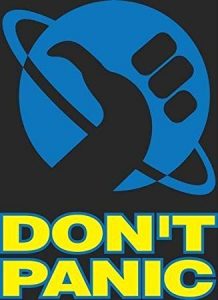
Ignorance
Right now, we are all dealing with an absence of information. The truth is, nobody seems to know where LeBron James is going. LeBron and his close friends may know. Maybe not. And knowing that LeBron doesn’t want an elaborate pitch doesn’t actually help us get to that answer any quicker.
Humans are terrible at dealing with ignorance. We are naturally pattern-seeking animals, always with an eye to make sense of the world. Our ancestors didn’t simply look up into the sky and shout “who knows why the Sun goes across the sky! We sure don’t!” No, they knew the god Helios pulled the sun across the sky every day. Jared Diamond explains in The World Until Yesterday: What We Can Learn from Traditional Societies that one of the original functions of religion was to explain the world, “pre-scientific traditional peoples offer explanations for everything they counter.” Also, the absence of information in a risky situation led to anxiety, which in turn led to supernatural rituals to deal with the anxiety.
Diamond gives an illustrative example involving two New Guinea fishing locations, as studied by Bronislaw Malinowski. The first fishing location was calm lagoon, which was “safe, easy, and offer[ed] predictable yields.” The second fishing location was the open-sea, often involving unpredictability and danger. Yet, it was only with open-sea fishing that involved “elaborate magical rituals before embarking.” The reliable and tranquil lagoon had no magic associated with it. Religious and supernatural rituals provided those dealing with uncertain and anxiety-ridden ventures with a sense of control, even though the rituals themselves did not materially affect the success or failure of the venture.
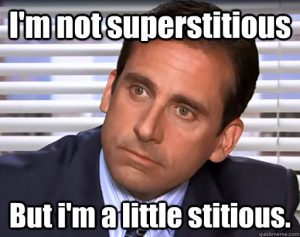
The trouble with how we deal with ignorance arises when we seek out answers and control absent good information. Our humility about the limits of our own knowledge seldom wins out over the craving for any explanation, especially one that confirms our preconceived notions about the world and gives us that warm and fuzzy feeling of contentment.
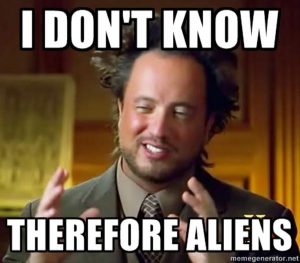
We can easily fall victim to a number of psychological pitfalls. Those that pretend to speak with the dead and bilk money out of the credulous rely on the psychological fact that we ‘remember the hits and forget the misses.’ Some people still think that horoscopes have explanatory power for their own lives. It’s not that we simply prefer having explanations and control over our lives, we fundamentally crave it as human beings. That craving makes some of us believe things even though all evidence points to the contrary.
Dealing with our own ignorance goes even deeper than psychological bias and motivated reasoning. Kevin Simler and Robin Hanson, in The Elephant in the Brain: Hidden Motives in Everyday Life, speak about how our brains will even completely make up explanations for things without realizing it. To illustrate this point, the authors relay a series of experiments done in the 1960s and 1970s by Roger Sperry and Michael Gazzaniga on patients who had undergone a corpus callosotomy, a surgical procedure that completely severed the patients’ left and right brain hemispheres. For a split-brain patent, their two brain hemispheres literally cannot transfer any information between themselves, and each side of the brain is left completely independent in control of some of the brain’s processes. The left side of the brain controls the right side of the body and is generally responsible for reasoning and speech; the right side of the brain controls the left side of the body. The researchers wondered what would happen if they told the right side of the brain to perform an action (through the patient’s left ear), but then asked the left side of the brain to explain why they performed it.
The results were startling. In one experiment with a patient, the researchers “asked a patient — by way of his right hemisphere (left ear) — to stand up and walk toward the door. Once the patient was out of his chair, they asked him, out loud, what he was doing, which required a response from his left hemisphere.” The correct and honest answer for the left hemisphere would have been to say, “I have no idea.” Yet, the left brain of the patient confidently answered the researchers: “I wanted to go get a Coke.” As Simler and Hanson explain, “[i]n other words, the left hemisphere, lacking a real reason to give, made up a reason on the spot.” And the craziest thing? The patient had no idea that his left hemisphere had simply made up an answer out of thin air. As it turns out, you can’t even trust your own brain.

Unrelated Photo
So what do we know? Absent information about the world, we seek patterns and make up explanations for events we cannot understand. We become anxious about uncertainty and develop rituals meant to deal with our ignorance. Even in the modern age, we can fall into the traps of credulity, craving control and explanations for things absent good evidence. And even if we keep a careful watch, our brains still might unilaterally fill in the gaps in our ignorance.
So where is LeBron going? If we let our ignorance drive us to make up conclusions absent actually knowing, we might believe any of the following: LeBron is certainly going to L.A. because of Space Jam 2. LeBron is certainly going to Philadelphia because he’s chasing Michael Jordan’s ghost, looking for championships, the West is loaded, and Phily has LeBron’s little brother, Ben Simmons. LeBron is certainly going to Houston because of his banana boat buddy Chris Paul. LeBron is certainly going to stay in Cleveland because the Cavs give him the best shot in the East to compete, Northeast Ohio is his home, and LeBron said that, “I always believed that I’d return to Cleveland and finish my career there.”
But remember, Don’t Panic. One thing is certain. We don’t know with any certainty where LeBron will go, and our ignorance will drive us crazy in the meantime if we let it.
Knowledge
How should we deal with ignorance? How can we actually know anything? Luckily for us, philosophers have been thinking about this subject since Ancient Greece, and philosophers call this field of study epistemology, or the Theory of Knowledge.
To be brief, there are several ways to attain true facts about the world, and many ways to be fooled. For example, a rite of passage for all children is to discover that their parents’ dictum because I said so is an unsatisfying answer to a question. Similarly unsatisfying is the because that’s the way we’ve always done it. As adults, we often run into arguments from emotion, where people argue that their passion, pain, and self-assuredness should be enough to overcome any doubts; yet, emotions by themselves have no truth value. Just because you feel something doesn’t make it true. So what can we rely on?
Our memory is decent for a general picture of our life, but remains deeply flawed. Just because you feel like you remember something doesn’t mean it happened in the way you remember it. Famed Astrophysicist Neil deGrasse Tyson often points out that “eyewitness testimony is the lowest form of evidence in the realm of science.” Bart Ehrman, in his book Jesus Before the Gospels: How the Earliest Christians Remembered, Changed, and Invented Their Stories of Their Savior, explains at length that our memories are incredibly fallible and prone to making mistakes. Even the moments in our life that we remember best and most vividly, called flashbulb memories, are surprisingly unreliable. Do you remember where you were when the Challenger exploded? Or when you heard about 9/11? You might be wrong.
Memories can even be completely made up, either by mistake or through deliberately planting them. You may have heard of the Mandela Effect, the curious way we all collectively remember something as happening, but we are all collectively incorrect. Many people thought that Nelson Mandela died in prison in the 1980s. Remember that great kids movie Shazam with Sinbad? Turns out, it never existed. And there are many more examples.

Planting a memory can be even more harmful, as discussed by Lawrence Wright in Remembering Satan: A Tragic Case of Recovered Memory. Wright describes the situation in the 1980s where a number of children were having their memories “recovered”, unveiling an epidemic of torture, sexual crimes, and satanic rituals. As it turned out, these memories had been planted through recovered memory therapy, a method that involved suggestiveness and hypnosis. Frighteningly, it can be as simple as asking someone to simply imagine an event that never took place.
What does this have to do with LeBron? Don’t trust someone who is certain where LeBron is going because they said so. You have a gut feeling that LeBron is going to [insert city here]? Don’t trust it. Remember when LeBron teamed up with Jordan Clarkson and Sinbad for Shazam 2: The Magical Dinosaur Riders and announced that he was retiring from basketball to create the Space Jam Cinematic Universe? Probably never happened.
So what can we trust? Remember rule number one: Don’t Panic. There is good news. We do have two tools at our disposal that work: Reason and Science.
Reason is the only universal human language we have to convey information and change minds. Steven Pinker points out in Enlightenment Now: The Case for Reason, Science, Humanism, and Progress that every conversation to find truth requires reason as the medium to communicate.
Reason, through deductive logic, gives us what Immanuel Kant described as a priori knowledge – knowledge we can deduce independent of experience. Think of Descartes’ I think, therefore I am and mathematical equations like two plus two equals four. We can rely on these conclusions as true pieces of knowledge. (Semantic aside: “reason” can refer to both deductive and inductive reasoning, as well as other forms of “reasoning” or “reasons” generally. I’m not trying to be particular about terms here; I’m simply trying to paint this picture in broad terms.)
Science also helps paint a true picture of the world. The foundation of science is empiricism, the pursuit of knowledge through gathering evidence and observing phenomena via experimentation. This source of knowledge is at the heart of much of what we do and how we think. If you see the sun rise in the east and set in the west for 1,000 straight days, you can reliably predict that the sun will do the same tomorrow. If you look at the data for airline crashes, you can reliably predict that the next flight you take will land safely.
Empiricism is also the basis for most of our basketball knowledge. We know that, in order to score points, the basketball has to go through the hoop (deductive reason). However, the empirical evidence lets us know that players under 5’0″ don’t stand a chance getting into the modern NBA. Modern analytics is rooted in empirical data. Those that criticize “analytics” as a vehicle for knowledge really don’t know what they’re talking about — all it consists of is the practice of trying to use data to predict results and improve your team. That’s why you don’t see teams that emphasize the three-point shot trot out a lineup of five 7-footers who can’t shoot more than 20% from three. I have an intense (and sometimes irrational) love and appreciation for Anderson Varejao, but I would still not call him a 3-point specialist.
Just as reason and science let us know what we know, it has a powerful and profound effect in letting us know what we don’t know. Science teaches us about the fallibility of because I said so authority figures, of strong men, of emotions, and of our own memories. It teaches us about our own ignorance, cautioning us to be humble in the face of the great unknown. We are taught to be comfortable without knowing everything. Despite our ignorance, science and reason compel us to continue searching for more and more knowledge. Incomplete evidence doesn’t mean we should jump to conclusions, but rather to maintain our humility and to continue searching for the truth. Ignorance isn’t scary — ignorance simply means we have so much more to learn.
What can reason and science tell us about LeBron? We know he’s currently a member of the Cleveland Cavaliers. He’s won the NBA Finals and has been named as the MVP. Empirically, when you compare the career statistics of LeBron James against the rest of NBA players, you realize he’s one of the best ever to play the game.
Reason and science also tell us to be humble. If past empirical evidence is a guide, his last two free agency decisions have been made in a deafening echo chamber of sports journalism speculation. Remember in 2010 when James was certainly going to play for the Knicks? Or, in 2014, James was leaning heavily towards re-signing with the Heat? If this past data is any indication, very few people actually know the truth, and importantly, even if they announce it to the world, it will be impossible for us to tell the difference between the truth and rampant speculation.
Simply put, there is no way to tell where LeBron James will end up. We are all ignorant about his decision until he actually announces his decision. With science and reason as our guide, we must be humble, guard against our baser instincts, and become comfortable with simply saying we don’t know.
The Absurd
We don’t know what LeBron James will do in Free Agency. The information so far — the cryptic photos, the wild speculation — none of it has given us any reliable empirical evidence as to what LeBron James will do. Absent actual knowledge, we are faced with a great, beckoning, unknown abyss.
We are faced with The Absurd.

The Absurd, coined by French writer Albert Camus in The Myth of Sisyphus, occurs in the clash between the human need for answers and the “unreasonable silence of the world.” Since the dawn of mankind, we have sought to explain away our ignorance; and yet, even with the tools of reason and science, we still can only explain a fraction of the mysteries of the universe. Big questions still loom. What caused the Big Bang? What is dark matter? What does it all mean?
Where will LeBron James go next?
Let us first think of Sisyphus. According to Homer, this Ancient Greek was eternally condemned to roll a boulder up a mountain, only to watch it roll back down under the force of its own weight. For Camus, Sisyphus represents a hero of the absurd, a hero in the clash between our desire for meaning and the indifference of the universe. Sisyphus rebels against the indifference and revels in his eternal struggle. Being faced with a path without answers, without meaning, “Sisyphus, proletarian of the gods, powerless and rebellious, knows the whole extent of his wretched condition” and presses on, with passion, with rebellion, with a zeal for his task. He embraces the absurdity of the situation with full knowledge of his eternal sentence — and in doing so Sisyphus becomes free. For Camus, the path Sisyphus takes is the best option — the only option we have in the face of our own human struggle.
Here we find ourselves with LeBron James, Sisyphus, and The Absurd.
We find ourselves at the bottom of the mountain of Sisyphus, rolling up a boulder of yet another LeBron Decision. We could give into the temptation of incessantly checking social media for any update on the situation, hoping that a “source with knowledge of the situation” can be our guide. But no, we must turn away from that temptation — there is no escape from our ignorance, from our boulder. Realize that our tools of reason and science can only get us so far — that absent LeBron James’ own words, our cries for answers will only be met with the silence of the universe. We are powerless in this struggle for answers. We know the full extent of our wretched condition, of waiting, for yet another LeBron James heartache or triumph.
We must press on. We must accept the limits of our knowledge, holding steadfast against the temptation of the false promises and comfort that credulity brings. We must continue to push our boulder, knowing that next week, next month, we shall watch the boulder roll back down the mountain after learning of LeBron’s next decision, and we shall start again with something else.
Embrace the fate of Sisyphus:
All Sisyphus’ silent joy is contained therein. His fate belongs to him. His rock is his thing. Likewise, the absurd man, when he contemplates his torment, silences all the idols. In the universe suddenly restored to its silence, the myriad wondering little voices of the earth rise up. Unconscious, secret calls, invitations from all the faces, they are the necessary reverse and price of victory. There is no sun without shadow, and it is essential to know the night. The absurd man says yes and his effort will henceforth be unceasing. If there is a personal fate, there is no higher destiny, or at least there is but one which he concludes is inevitable and despicable. For the rest, he knows himself to be the master of his days. At that subtle moment when man glances backward over his life, Sisyphus returning toward his rock, in that slight pivoting he contemplates that series of unrelated actions which becomes his fate, created by him, combined under his memory’s eye and soon sealed by his death. Thus, convinced of the wholly human origin of all that is human, a blind man eager to see who knows that the night has no end, he is still on the go. The rock is still rolling.
I leave Sisyphus at the foot of the mountain! One always finds one’s burden again. But Sisyphus teaches the higher fidelity that negates the gods and raises rocks. He too concludes that all is well. This universe henceforth without a master seems to him neither sterile nor futile. Each atom of that stone, each mineral flake of that night-filled mountain, in itself forms a world. The struggle itself toward the heights is enough to fill a man’s heart. One must imagine Sisyphus happy.
We must embrace this moment in history. Our history. Our torment. Our ignorance. Our uncertainty. It is all ours, our collective journey as Cavaliers fans. Revel in this moment, and in all the moments of LeBron James. Embrace our own boulders, of every Finals against the Warriors, of dealing with Ty Lue’s rotations, of yet another LeBron James Decision. Embrace everything. Embrace the Absurd.

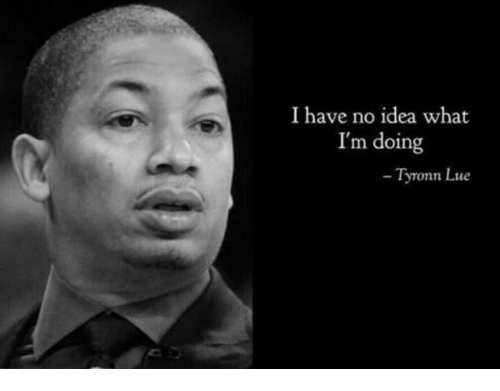
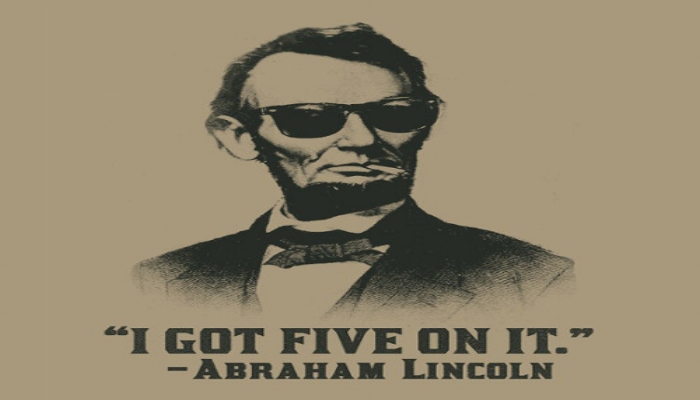
So he declined, so it begins.
All this really does is rule out teams like Houston and Boston. He wasn’t going to go there unless they worked some sort of opt-in and trade with the Cavs. (Unless he wants to sign a vet minimum). This pretty much narrows it down to Cleveland and LA as they’re the ones that can max him out. Philly might have an outside chance if he doesn’t mind a paycut.
not going to look elsewhere for hot takes, true facts, etc.
Is the possibility of another 1-and-1 deal likely, possible, remote?
Will check later –now back to day job. Thanks
Yes, I believe so. Cleveland still have his bird rights, so if he really wanted to go to the Lakers but the situation with Kahwi and Paul wasn’t shaking out, he could still do a 1-and-1 and do the same thing again next year. Could be a bit risky at age 33 though, as if he blows out an Achilles or something, he would only have two years of guaranteed money instead of 5.
LeBron James has opted out…
Dun dun dunnnnnnn
Lebron isn’t going to LA, Philly, Houston, or staying in Cleveland. He just signed with Mars One. Said he wanted to meet with Marvin prior to the big game to make sure everything was on the level with regards to the refereeing. Doesn’t want the Monstars getting the same advantage the warriors did/do.
Marvin who?
He is a guy/creature? that hates rabbits for some reason.
He calls Mars home.
Also while Mars One standard contracts are normally for life, Lebron demanded an early opt out clause, so he could be a free agent again in a year barring technicalities.
The Heat are apparently in on the Leonard sweepstakes
26 hours to deadline #1.
Come on Koby, pull a rabbit.
So if Junior jumps off a cliff…
https://twitter.com/SportsCenter/status/1012460945115926528
He just jumped into a lake. Must mean he’s going to the Lakers.
Actually… we don’t know if he jumped in the lake… you are assuming that Kawhi pushed him… lol
Could be Lake Erie.
He was acting kind of cavalier about it though.
Lol… “ah let’s go, let’s go, let’s get the heck out…. no way I’m not doing this, no way- not jumping”
https://twitter.com/FIBAWC/status/1012423140562034688?s=19
that sound you hear is me beating my head into a wall
Cavs gonna Cav. T-Lue gonna T-Lue.
Lue will rather trot the beaten corpse of JR for 30+ minutes than give this dynamo a legit shot.
I hate Lue.
Love the emotion he plays with. Must feel good for him to actually get out there and compete.
http://i.capsspot.com/s/11/10/1178394.png
Love the aggression here on offense. Needs that same mentality when he comes back to Cleveland.
Yeah, but imagine what JClarkson would be doing out there…./s
Man, it’s too bad Cedi didn’t show this kind of potential for the Cavs. We could have used him in the Finals /s
I think Lebron should wait to decide until the day before training camp, just to watch everyone go completely crazy.
https://twitter.com/BleacherReport/status/1012429865671245824
nice piece. Always amused by the use of the phrase “true fact”. …Are there any other kind?
Alternative Facts
It’s 2018 man. All kinds of facts.
Sure. If certain cherry picked statistics are technically facts, but nonetheless can be lumped in with “lies and damned lies” based on context, then logically, there must be all kinds of facts.
Haha! Good criticism! I hate the phrase “true facts.” I typed it without thinking.
2018 has been a rough year for normal language.
No mention of Nostradamus?
That is a great example, I should have included it!
Excellent piece. NDGT and hoops together. This tidbit on the brain experiment was fascinating.
Thanks – and yeah when I first learned about the split brain patients my mind exploded. The whole book is great, but that part stands out.
https://twitter.com/joevardon/status/1012410683068215303
I absolutely enjoy listening to DeGrasse, along with Dawkins, Hitchens and DFW (for a cool mixer).
Who is DFW?
David Foster Wallace?
Yes.
call me “OLD SCHOOL “—-I really enjoyed watching gm’s “put together teams ” via the draft / intelligent trades / good coaching of young players —-the so called ” NBA / AAU “—FORMAT of recruiting super teams is really turning me off—-not saying that just because LeBron might be leaving but in general just tarnishing / ruining the league—just my opinion
I’d be happy if LBJ recruited PG13 to Cleveland. I wouldn’t care…but I care more about Cleveland’s success than the integrity of the league…
In the Cleveland movie script for the story of this summer… Boston trades Kyrie and picks to the Spurs for Kawhi on the day his movie Uncle Drew hits theaters… encouraging LeBron to stay put and the Lakers to overpay for Boogie Cousins…
Green light that script!
And rush to production!
Except SA is the last team likely to get stuck with Kyrie, who is injury prone, probably way past his prime, and absolutely a head case.
Fedor thinks Lue is hear for the long haul. He said Lue is excited to work out with Clarkson and Sexton this summer.
Oh I’m sure he’s not leaving by choice.
He alluded that the organization is committed to him.
Someone should have them committed.
Terrific read JMKP!
Thanks! Anytime I can bring Camus and Tyson into the same conversation is a good day.
This has a classic Melo to NY feel.
Then the Cavs would get some assets back, which I’m not sure is possible, being over the luxury tax.
I meant the Kawhi situation
Yes, it is. Hope Spurs take their own time to trade Kawhi to Lakers though.
I’m sure you do.
well, that is because I don’t think LEbron should go to Lakers. Hope Lebron makes a decision to stay with Cavs or go to celtics or 76ers where he would have best chance to make finals.
Today’s happenings, not the article (which is excellent, James)
https://twitter.com/sam_amick/status/1012367563035062273
Bah, humbug.
Celtics can.
Celtics can destroy any Lakers offer. The question is will they? For a pouty, limping, enigmatic Kawhi- no they will not.
Holy crap, a Bart Erhman reference??? Camus? Kant? Thanks for making my degrees feel less useless lmao!!!
As my late college advisor said, earning a religion and philosophy degree means that one will be an expert in conversation at a cocktail party LOL!
Now if you combine the philosophical cocktail party with Cleveland sports and Game of Thrones/Westworld discussions, you’d have yourself a winner.
Good article. I still am basically ignoring the entire story, though. I have zero control over what happens, and what will happen will happen. I have less than zero interest in the media speculation, too, but unfortunately it makes some podcasts I enjoy unlistenable until this is over. Hope Lebron stays (although I personally doubt he does), but if he leaves I DEFINITELY won’t miss the media obsession and the media circus.
Holy crap, great narrative! Thanks for the book list. Now I have a few books to read this summer.
Thanks! I’d recommend Enlightenment Now and Elephant in the Brain to start.
If you’re interested in New Testiment scholarship from a historical (not theological) perspective, Bart Ehrman is phenomenal. He has a lot of good stuff on YouTube in terms of lectures and debates.
For Camus, my fav book of his is The Fall.
Jared Diamond wrote my fav non-fiction book of all time, Guns, Germs, and Steel. If you had to read just one book, I’d recommend that one.
Sorry, my trusted source tells me that Lebron is going to the Sixers: https://bit.ly/2KvPC2e
At any rate, great read James. I feel entertained and educated at the same time!
Don’t know what source you’re listening to! Mine assures me he is staying put
Haha that’s exactly what it feels like, doesn’t it? Great link.
When I spun, it came up Cleveland BROWNS!